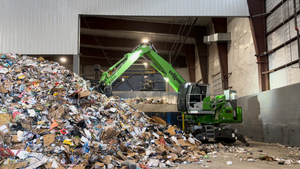Building better bottles
October 1, 2004
With dual emphases placed on speed and accuracy by customers, the PET bottle market leaves little room for error or production delays, forcing many bottle manufacturers to turn to inline inspection technologies.
Knowledgeable customers with stringent quality requirements mean there is precious little margin for error at the King''s Park PET container plant owned by Australia''s Visy Industries Ltd. The facility''s three Krones Contiform blowmolding machines generally run at speeds of 30,000 to 45,000 bottles/hr, with daily output as high as 2.5 million containers.
The company installed Agr*TopWave PETWallplus with Vision process monitoring inside each machine to not only keep defective product from reaching customers but also to prevent protracted manufacturing of nonconforming bottles. Online for slightly more than six months, the system has helped Visy achieve high-volume production.
According to Mark Schierhuber, manufacturing operations manager, VisyPak, the guiding philosophy at King''s Park is to reduce costs, remove mundane tasks, automate wherever possible, and add value to the manufacturing process. Agr''s PETWallplus helps accomplish these objectives by providing real-time feedback on blowmolder functions so operators can intervene to control the process. Because the system is co-located with the mechanics, it can link individual bottles to specific molds and spindles, saving time and effort normally expended tracking down defect causes.
How it works
The PETWallplus works by using infrared light absorption techniques to produce measurements of up to four user-definable locations per container. The system combines noncontact wall-thickness monitoring with camera-based inspection to examine bottles for deviations in material distribution. The vision and thickness data are displayed in a variety of formats on a freestanding, high-resolution user interface. Touch-screen controls allow operators to view this continuously updated information in the form of charts and graphs so they can evaluate overall blowmolder performance at a glance.
Schierhuber calls the PETWallplus "an enormously useful processing tool" that takes some of the guesswork out of blowmolding. Previously, it had been difficult to trace defects back to a specific machine condition, but with the PWPlus, however, material changes and process shifts are translated into data displayed on the system''s screen. Now, operators are able to conclude whether rejected bottles signal an abnormal situation requiring corrective intervention, or whether they are the result of a minor problem-for example, slight damage to the top face of a container caused as the preforms tumble through the unscrambling process.
The PWPlus also gives Visy a productivity boost when it comes to machine changeover. King''s Park''s blowmolders manufacture more than 60 different container sizes and shapes, with the average run length of 600,000 bottles turned out in less than three shifts. This speed makes changeover a daily task that must be executed quickly and efficiently so bottles perform to specifications.
But even with stable routines, seasonal variations in temperature and humidity place stress on PET material, especially in hot weather. One potential problem that can arise is cracking in the container base-a serious defect that could result in burst bottles on the filling line. By monitoring material distribution, the system alerts operators to such deficiencies and allows them to respond.
"The more we can do now to ensure even material distribution-in other words, the more perfect we can get the bottle-the less likely we are to have such troubles out in the field," Schierhuber says.
In addition to its trouble-shooting assistance, the PETWallplus also performs basic container inspection, taking advantage of the blowmolder''s reject mechanism to eliminate product with random visual flaws.
New owner, new markets
Based in Melbourne, Visy Industries is a large privately-held packaging and recycling company. Its entry into PET containers occurred a few years ago with the purchase of facilities put on the block first by Southcorp Ltd. in 2001, and then by Coca-Cola Amatil (CCA). Shortly thereafter, the packager invested approximately $80 million to upgrade all the plants in its new network.
Located outside of Sydney, King''s Park is the largest of Visy''s bottle-making operations. While the market for carbonated beverages in Australia is currently static, demand is rapidly growing in up-and-coming sectors like juices and waters. Under Visy''s management, the plant, which was formerly owned by CCA, has expanded its customer base beyond its original Coca-Cola bottle business to include product for Pepsi, Cadbury-Schweppes, and P&N. Production volume has grown as well, with output now approaching 650 million containers per year.
These bottles are all made from preforms produced on site in the other side of the plant, where a climate-controlled environment houses 11 Husky injection molding machines churning out roughly 1.8 billion units per year. Destined for both domestic use and export, Husky output undergoes two different kinds of inspection to make sure it performs properly in the blowmolder.
AGR''s Preformer examines finished product samples from each injection machine at specified intervals for cosmetic and structural defects. Operating at speeds up to 22,000 preforms/hr, the machine''s electro-optical inspection checks sidewall and base regions for a variety of flaws, from foreign particles to chromatic variations. A vacuum test module verifies the integrity of the seal surface and identifies leakers, an especially important test for Visy''s overseas customers. The Preformer also automates the re-sorting process for good and bad ware, inspecting preforms rejected by the injection machine to reclaim usable product.
Also on the post-production side is Agr''s Vision Bottle Gauge (VBG) for preforms, which conducts checks of preform weight, inside bore, and finish dimensions. Data from the VBG inspections are used to help determine predictive maintenance of molds and ensure long-term product quality.
Contact information
Agr International |
You May Also Like


